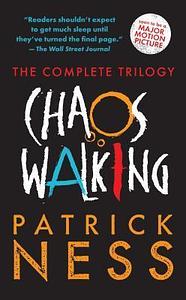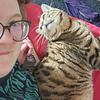Take a photo of a barcode or cover
Really good dystopian fiction with a different take on the genre.
The unique mechanic in this trilogy was an alien virus that caused the thoughts of human males and all native/alien animals to be broadcast telepathically. This leads to the interesting situation where woman are considered "silent" and unnatural, resulting in a different take on the typical prejudice against women from men. As the trilogy progresses, this condition is explored and finer details emerge modifying the story line in interesting ways.
Labeled as young adult, I felt it read at a higher level and left out many of the more tedious YA tropes - young people against adults, dystopian setting, etc. The relationship between the protagonists was well-handled and seemed natural and unsurprising as time progressed in the book. This deserves a star right here as most YA stories tend to be ham-handed and simplistic as hell, often dragging the main plot down or derailing it entirely.
The main villain was also a great surprise as he was nuanced and had great motivation and intelligence.
Labeled as young adult, I felt it read at a higher level and left out many of the more tedious YA tropes - young people against adults, dystopian setting, etc. The relationship between the protagonists was well-handled and seemed natural and unsurprising as time progressed in the book. This deserves a star right here as most YA stories tend to be ham-handed and simplistic as hell, often dragging the main plot down or derailing it entirely.
The main villain was also a great surprise as he was nuanced and had great motivation and intelligence.
adventurous
challenging
tense
medium-paced
Finished book 1 - wow!
Even though I really enjoyed the world, the plot and the characters I'm going to have to leave it at book 1.
I don't know how I'll feel about the movie (if I go see it), but there was such an interesting cause and effect in this book/series.
I enjoyed the writing style - the voice was VERY clear and unique from other books I've read. It took some adjusting to, but I quite liked it.
Even though I really enjoyed the world, the plot and the characters I'm going to have to leave it at book 1.
I don't know how I'll feel about the movie (if I go see it), but there was such an interesting cause and effect in this book/series.
I enjoyed the writing style - the voice was VERY clear and unique from other books I've read. It took some adjusting to, but I quite liked it.
Definitely one of my favorite books of all time. It has such an amazing story, you fall in love with the characters almost instantly and you suffer soo much hahahaha. Supee recommended
I read the first two a while back and finished the second half of the last book end of last year and omg I loved this series it will always have special place in my heart, I read these as I knew they were being turned into a movie so I thought I’d give them a try, bit irritating how the last book ends on cliff hanger.
great premise. very original. enjoyed the first 2 books more than the third. the ending felt rushed to be wrapped up.
I'm reviewing this trilogy as a single book, because that's how I devoured it. This is another one of the young adult books that tackles a morally ambiguous universe in a clear-eyed, realistic, and useful way, without skimping on all the other elements that make young adult fantasy so great (aliens, a love story, struggles for power!, enhanced mental abilities, a long journey, talking animals, etc.)
You can read the synopsis of the story anywhere else, so I'll just say the essentials here: A world where everyone can hear what every man thinks, but not what any woman does. An intelligent native species. A struggling human colony with another wave of settlers on the way. A girl from space. A boy who doesn't know history in a world of adults driven by their interpretation of the past.
There are a lot of books that pit young adults against grown-ups who don't live up to expectations or who turn out to be deeply flawed. The thing that really sets this story apart is the time Patrick Ness devotes to demonstrating that everyone is flawed, that flawed doesn't mean unredeemable, and that being redeemable doesn't always mean that you get redeemed. He explores how people betray their own principles when they get caught up in struggles for power, but also when they're acting to protect people they love. He shows how easy it is to become just moderately evil in the service of preventing a greater evil, and the consequences that can have.
Nobody in this book is a hero without stain. Nobody in this book is utterly evil. Nobody in this book is selfless, and nobody gets to escape the past unharmed.
The story starts with intra-human conflicts, but in the latter half of the series broadens to include an unexpectedly deep storyline about the human-alien war that, like Laini Taylor's Daughter of Smoke and Bone series, digs into how two sides in existential conflict can choose to move toward peace. The story here is more more than Us learning to perceive the Other as creatures like ourselves. It digs into the choices around reconciliation and forgiveness and revenge in ways that are very uncharacteristic for young adult fiction.
And, because Patrick Ness deserves praise for this too, the story includes powerful (but imperfect) women, people of color, people of different sexual orientation, and people of differing mental abilities, all without making a big deal out of it or blaring a big "Look how inclusive my story is!" sign. They're just people, and being from a historically marginalized group doesn't get them special treatment or give them an inexplicably superior moral compass.
One quick caveat for those of you who don't like it when books get creative with the layout of their text: there is a fair amount of text illustration (several fonts are used throughout the book - generally to a good purpose, in my opinion). Additionally, a lot of sentences in the story end with dashes, so if look at a page of Emily Dickenson's poetry fills you with homicidal rage, you might want to find a stick to bite on while you read this.
But you should read it, because it's true.
You can read the synopsis of the story anywhere else, so I'll just say the essentials here: A world where everyone can hear what every man thinks, but not what any woman does. An intelligent native species. A struggling human colony with another wave of settlers on the way. A girl from space. A boy who doesn't know history in a world of adults driven by their interpretation of the past.
There are a lot of books that pit young adults against grown-ups who don't live up to expectations or who turn out to be deeply flawed. The thing that really sets this story apart is the time Patrick Ness devotes to demonstrating that everyone is flawed, that flawed doesn't mean unredeemable, and that being redeemable doesn't always mean that you get redeemed. He explores how people betray their own principles when they get caught up in struggles for power, but also when they're acting to protect people they love. He shows how easy it is to become just moderately evil in the service of preventing a greater evil, and the consequences that can have.
Nobody in this book is a hero without stain. Nobody in this book is utterly evil. Nobody in this book is selfless, and nobody gets to escape the past unharmed.
The story starts with intra-human conflicts, but in the latter half of the series broadens to include an unexpectedly deep storyline about the human-alien war that, like Laini Taylor's Daughter of Smoke and Bone series, digs into how two sides in existential conflict can choose to move toward peace. The story here is more more than Us learning to perceive the Other as creatures like ourselves. It digs into the choices around reconciliation and forgiveness and revenge in ways that are very uncharacteristic for young adult fiction.
And, because Patrick Ness deserves praise for this too, the story includes powerful (but imperfect) women, people of color, people of different sexual orientation, and people of differing mental abilities, all without making a big deal out of it or blaring a big "Look how inclusive my story is!" sign. They're just people, and being from a historically marginalized group doesn't get them special treatment or give them an inexplicably superior moral compass.
One quick caveat for those of you who don't like it when books get creative with the layout of their text: there is a fair amount of text illustration (several fonts are used throughout the book - generally to a good purpose, in my opinion). Additionally, a lot of sentences in the story end with dashes, so if look at a page of Emily Dickenson's poetry fills you with homicidal rage, you might want to find a stick to bite on while you read this.
But you should read it, because it's true.
Probably my favorite series of all time.
I have never been so actively stressed out by any books as I was by these three. Even when I wasn't reading, I was incredibly worried about what would happen to the characters. And it's stuck with me for a while now.
Deals really well with issues of difference, complicity, right and wrong, and societal expectations. But it doesn't feel like any of these issues are really forced on the reader; the author isn't really heavy handed with them.
Highly recommend to anyone.
I have never been so actively stressed out by any books as I was by these three. Even when I wasn't reading, I was incredibly worried about what would happen to the characters. And it's stuck with me for a while now.
Deals really well with issues of difference, complicity, right and wrong, and societal expectations. But it doesn't feel like any of these issues are really forced on the reader; the author isn't really heavy handed with them.
Highly recommend to anyone.


